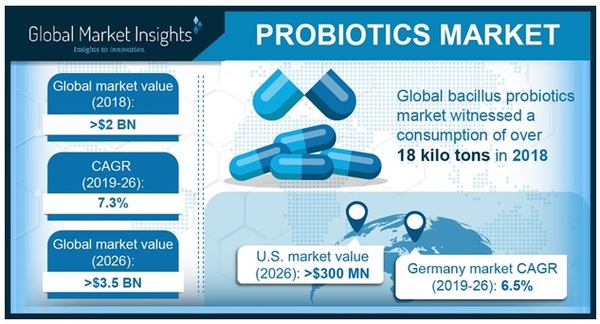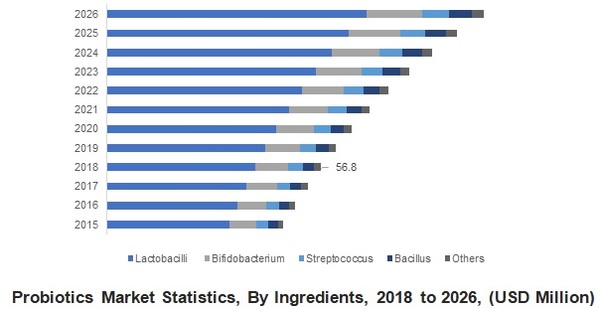Probiotics Market size to exceed $3.5 bn by 2026
Published: December 20, 2019
By: https://www.gminsights.com/industry-analysis/probiotics-market
Owing to the extensive application spectrum across dietary supplements and functional food industries, the worldwide probiotics market is being increasingly referred to as one of the most promising business verticals around the globe. Apparently, the rising significance of functional foods can be attributed to the fact that these food additives are gradually and steadily acquiring a prominent position in the dietary profile of a sizeable number of health-conscious consumers.

It goes without saying that this trend has, in turn, created a host of lucrative growth avenues for the leading probiotics industry participants which would eventually expand the market size of this business space. Furthermore, the growing awareness among customers pertaining to the health benefits that can be derived from the consumption of probiotic products is fueling the probiotics market progression. While interpreting the future growth prospects of the overall probiotics market space, it is quite imperative to bear in mind that the total valuation of this business arena stood at an impressive number in 2017, as per a report compiled by Global Market Insights, Inc.
Elaborating further, it is prudent to mention that the global probiotics market has been gaining traction due to a marked increase in the utilization of probiotic strains in various food applications. These probiotic strains, which predominantly include lactobacilli and bifidobacterial, actively develop resistance to bile, antimicrobial, and acid production which further assists in boosting the digestive and immune system, subsequently improving the overall human health.
Citing an instance to highlight the rising prevalence of probiotic strains, the foremost probiotics industry giant, DuPont Danisco has recently claimed that the food products consisting of HN019, the firm’s Bifidobacterium lactis strain, have been recognized as Food with Function Claims by Consumer Affairs Agency of the Government of Japan. Dietary supplements, drinkable yogurts, and other food products containing HN019 as an ingredient are said to enhance microflora and improve digestive health by addressing intestinal ailments. Moreover, HN019 is being considered as the first Bifidobacterium lactis strain that has ensured a probiotic manufacturer to establish a health claim on the product.

Apparently, the recent instances of recognizing the health benefits of probiotic products it will enable consumers to make more informed decisions, consequentially having far-reaching implications on the growth potential of probiotics market. For the record, in the U.S. alone, probiotics market size from food supplements is likely to cross USD 5 million by 2024.
To complement the aforementioned statements, the global probiotics industry has been witnessing a marked increase in research activities which has further expanded the market size of this business space. Strong clinical evidences have been apparently emerging which have offered new insights into the efficacy and effectiveness of the existing food products in probiotics industry in treating mental ailments and neurological diseases. As per reliable sources, a few researchers and doctoral candidates would present the results of pilot studies at the upcoming IPA World Congress + Probiota 2018, which would reportedly demonstrate the tolerability and safety of probiotic supplements that can be used to treat depression. Apparently, the findings received from recently conducted pilot studies indicate compelling evidence that would underline the importance of probiotic supplements, something that will eventually provide a massive boost to the efforts being put in by the major probiotics industry players to expand their business and consumer reach.
Concurrently, the rising technological innovation in medicinal industry to inculcate probiotic foods in treating bad gut bacteria, intestinal inflammation, urogenital infections, microbial balance by lowering pH level, mental illness/disorders, reducing heart disease risks, and diagnosing and treating a range of other physical and mental health complications would embellish the future growth prospects of the overall probiotics market, which is forecast to exceed a valuation of USD 3 billion by 2024.
Source
https://www.gminsights.com/industry-analysis/probiotics-marketRelated topics:
Recommend
Comment
Share

Would you like to discuss another topic? Create a new post to engage with experts in the community.





